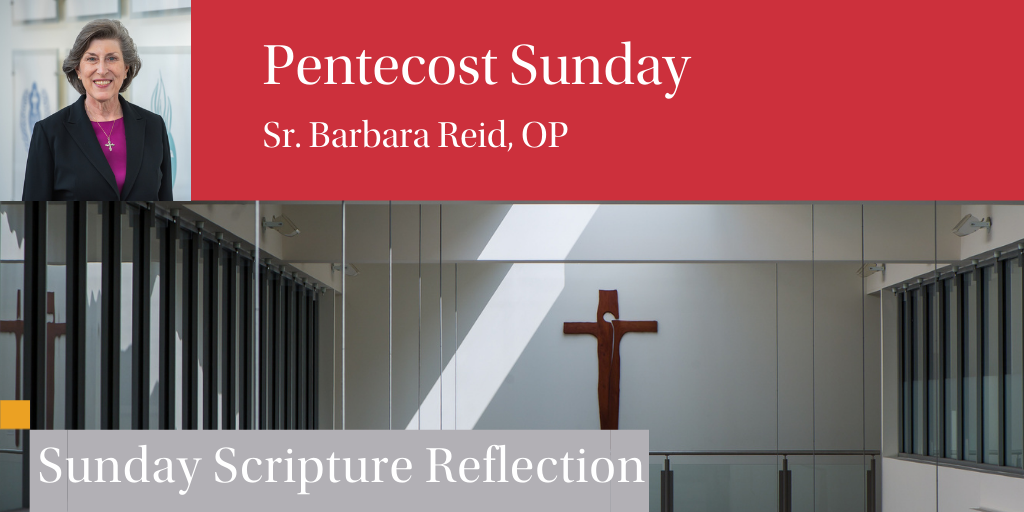

Readings:
Reading I: Acts 2:1-11
Psalm 104:1, 24, 29-30, 31, 34
Reading II: 1 Corinthians 12:3b-7, 12-13
Gospel: John 20:19-23 or John 14:15-16, 23b-26
“[H]e breathed on them and said to them, ‘Receive the Holy Spirit’” (John 20:22)
“I can’t breathe,” is one of the most terrifying phrases one can utter. These were Eric Garner’s last words as he was asphyxiated in a chokehold by a New York City policeman in 2014, words that have now become a rallying cry for justice in the Black Lives Matter movement. Countless victims of COVID-19 have also suffered the terror of not being able to catch their breath. People with asthma likewise struggle to breathe as air pollution rises. In light of these kinds of experiences, Jesus’s breathing on his followers and imparting his Spirit takes on new meaning.
Since ancient times, breath is equated with life. Indeed, the first creation account in Genesis depicts the life force of the Creator as ruaḥ, “breath” or “wind,” which swept over the face of the primordial waters. And in the second account of creation, the first human creature becomes a living being only when the Creator breathes the breath of life into its nostrils (Gen 2:7). At Pentecost, it is this same divine life force that recreates a frightened group of disciples into bold proclaimers of the gospel.
The description of Pentecost in today’s first reading from Acts 2 brings out familiar symbols of divine presence: thundering noise, as God’s manifestation at Sinai (Exod 19:16); a whirlwind, like that from which God spoke to Job (Job 38:1); and flames of fire, such as Moses saw at Mount Horeb (Exod 3:2). As in previous times of critical need, God’s presence is visible and audible, profoundly transforming those who experience it. The disciples, like anyone who has experienced the death of a loved one, would have felt that something of their own spirit and zest for life had also been snuffed out with Jesus’s death. Huddled together, trying to comfort one another, they were unable to muster any energy for carrying on his mission. Grief and fear had deflated any impetus to continue the movement into which he had drawn them.
In both gospel choices for today, we have a glimpse of some concrete ways in which the Spirit brings them and us back to life so as to go forth again in mission. In John 14, Jesus is telling his disciples before his passion that he will not leave them alone. He promises to send the Paraclete to be always with them. Only the Fourth Evangelist uses this term for the Spirit. It comes from the legal world, and connotes one who stands alongside another, as advocate, or as comforter. Not only does the Paraclete teach the disciples and remind them of everything Jesus told them, but this consoling one is as near as one’s own breath. When Jesus speaks to those whom he loves of their oneness with him and with the One who sent him, he speaks of mutual indwelling.
In John 20, the risen Christ breathes on the disciples and infuses them with the Spirit. He unleashes in them the power of the Spirit, who alone can bring peace and joy in the wake of terrifying woundedness. He directs them to open themselves to the gift of the Spirit that allows them to receive and give forgiveness. For it is only through the power of forgiveness that the air can be cleared and all can breathe in the peace for which we so long and which the risen One desires to give.
Perhaps it is breath that best signals this intimacy. God, in the person of Jesus and the power of the Spirit, is as close to each and every believer as is our very breath, taken deeply into our lungs thousands of times every day, a constant vivifying force. Just as breath must be exhaled, and cannot be kept within, so too does the Spirit’s power direct us outward to mission, exuding the love, peace, justice, and forgiveness we have inhaled from the Living One.
It is this Spirit that empowers us to work for justice for those whose lives are snuffed out violently and to co-create with God a world in which all are able to breathe freely.